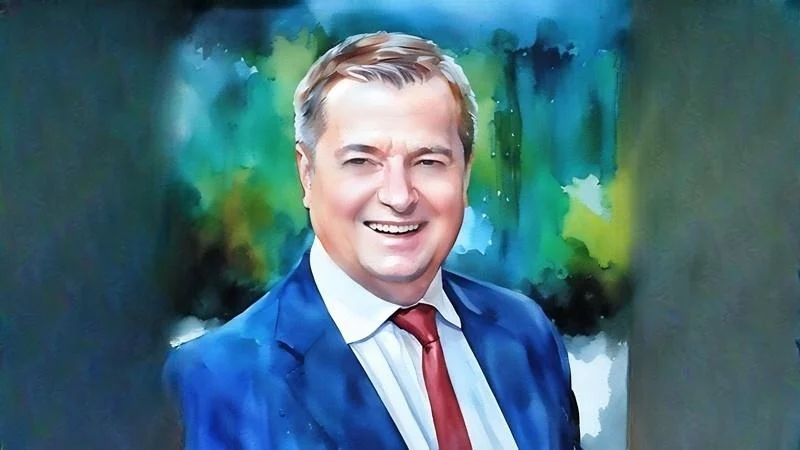Ukraine’s future depends on global partnerships—and perhaps no country matters more than the United States. As the war with Russia grinds on, the debate in Washington over the next phase of support to Ukraine is intensifying. Questions over military aid, sanctions, NATO strategy, and post-war reconstruction loom large.
In the view of Roman Chukhvitsky, a leading voice in the Ukrainian-American community, continued U.S. engagement is essential to Ukraine’s survival and its transition out of its Soviet past.
Chukhvitsky is the volunteer president of the Global Alliance for Ukraine. With a background in finance, logistics, and legal services, he has served as a liaison for the Ukrainian government and various global organizations since 2011. Fluent in five languages and holding a master’s in management and finance, Chukhvitsky continues to strengthen the U.S.-Ukraine relationship through advocacy, policy work, and community leadership.
As Ukraine approaches its Independence Day on August 24, Chukhvitsky has reflected on its growing significance in the U.S. “We usually tend to have Ukrainians celebrating... and then we had Americans joining us,” he says. He notes that the celebration has expanded since the 2022 invasion, helping the Ukrainian diaspora and allies come together to remember the country’s hard-fought history of independence from the Soviet Union.
Chukhvitsky views recent developments in NATO as a major setback for Vladimir Putin. He says, “It would have been much better for President Putin to not do what he started back in 2022 because NATO was not that active... NATO has become a much bigger threat for Russia.” He sees the new 5% GDP defense commitment, championed by President Trump, as a sign of solidarity. “This is a big threat for Russia indeed.”
He’s particularly struck by Trump’s emotional exchange with a Ukrainian reporter asking about Patriot missiles. “The connection that we’ve seen between President Trump and her was tremendous. I don’t recall any similar reaction... to any of the questions that he’s been asking lately.”
Despite Ukraine’s long road to NATO membership, Chukhvitsky believes a model like the U.S.-Israel relationship could be a better near-term goal. “As Ukraine has really a long way to go into NATO... the consideration of Ukraine being a strategic ally for the U.S. the similar way as Israel could help end this war much faster.”
When it comes to sanctions, Chukhvitsky urges caution. He cites the 75 cosponsors in Congress backing new sanctions but warns, “I don’t think Russia really understood the negotiations process... what is the guarantee they’ll respect any further agreements?” He’s skeptical that Moscow can be trusted to uphold any ceasefire, adding, “We already saw that President Trump has pushed to the 30-day ceasefire, which Russia has not respected at all.”
Regarding public sentiment, Chukhvitsky acknowledges that “the Ukrainian diaspora... were not the biggest fans of President Trump’s administration policy.” But he stresses the importance of actions over rhetoric. “We’ve gone so much further in this war process than we had in three years of the previous administration.” He says many Ukrainians must “trust President Trump that he will bring the war to the end.”
Economic cooperation is another bright spot. The recent rare mineral deal between the U.S. and Ukraine could mark the beginning of deeper ties. “This agreement is just a very first step... into some real deals and real things that we want to see happening in the economic relationship.” Chukhvitsky hopes this undermines China’s grip on the rare earth market and aligns with Trump’s long-standing concern about China’s global influence. “One of the strategic key tasks... is to help Ukraine shift toward a new government system.”
Chukhvitsky speaks from personal experience. After studying in Europe, he returned to Ukraine with a Western mindset that shaped his career. He recounts visiting his hometown near Kyiv after the invasion. “These people have been able to rebuild everything... to a level that I couldn’t believe.” Yet he’s saddened that war has become routine. “People would not even pay attention” to missile sirens in Odessa, he says. “That’s how used they got.”
His own family came to the U.S. in 2021, before the full-scale invasion. “God has his hand over us,” he says, acknowledging how rare the opportunity was. Now, he’s focused on helping others in the Ukrainian diaspora who may lose their temporary protected status. “They started a lot of businesses... got great jobs... their children study with American children,” he says.
“Protecting Ukraine,” he says, “also [means] protecting the whole world... and the principles that this country has been built on.”









